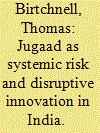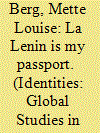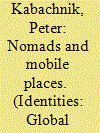|
|
|
Sort Order |
|
|
|
Items / Page
|
|
|
|
|
|
|
| Srl | Item |
| 1 |
ID:
147004


|
|
|
|
|
| Summary/Abstract |
The Moken and Moklen are an indigenous population residing along the Andaman coast of Thailand. They have been represented, both in popular and academic discourse, as seafaring nomads living in traditional boats and small temporal coastal communities. The overwhelmingly precept of the existing literature about the Moken is one of vulnerability and of stemming the erosion of ‘authentic’ Moken cultural identities. Identification of Moken as being under threat transpired as a consequence of the 2004 Asian tsunami, in which many Moken were killed and the plight of others who had their houses and sources of livelihood destroyed was propelled onto an international stage. This paper critically discusses how Moken identities and associated discourses of vulnerability have been depicted in media and academic literature as fixed and traditional. We argue that such rigid identity narratives contrast sharply to the contemporary realities of the Moken identities as articulated by the Moken we interviewed.
|
|
|
|
|
|
|
|
|
|
|
|
|
|
|
|
| 2 |
ID:
108914


|
|
|
|
|
| Publication |
2011.
|
| Summary/Abstract |
Jugaad is the latest/trend in management and business reports of India's awakening. The term refers to the widespread practice in rural India of jury-rigging and customizing vehicles using only available resources and know-how. While the practice is often accompanied by indigence and corruption in traditional interpretations, the notion of jugaad has excited many commentators on India's emergence into the global economy in its promise of an inimitable Indian work ethic that defies traditional associations of otherworldliness and indolence - widely reported as inherent in India's society and culture. Jugaad has been identified across India's economy in the inventiveness of call-centre workers, the creativity of global transnational elites, and in the innovativeness of Indian product designs. The term has seen an unprecedented growth in popularity and is now proffered as a tool for development and a robust solution to global recession. Jugaad is now part of a wider method for working within resource constraints as 'Indovation'. In this context, the trope is presented as an asset that India can nurture and export. This article argues that far from being an example of 'disruptive innovation', jugaad in practice is in fact part and parcel of India's systemic risk and should not be separated from this framing. Viewed from this optic, jugaad impacts on society in negative and undesirable ways. Jugaad is a product of widespread poverty and underpins path dependencies stemming from dilapidated infrastructure, unsafe transport practices, and resource constraints. These factors make it wholly unsuitable both as a development tool and as a business asset. The article questions the intentions behind jugaad's wider usage and adoption and explores the underlying chauvinism at work in the term's links to India's future hegemonic potential.
|
|
|
|
|
|
|
|
|
|
|
|
|
|
|
|
| 3 |
ID:
137925


|
|
|
|
|
| Summary/Abstract |
Based on an ethnographic study of transnational networks of alumni of an academically selective boarding school in Havana, this article explores the nexus between mobility, schooling and belonging in the context of socialist Cuba and its diaspora. Drawing on Goffman’s work, I argue that the boarding school experience was transformative; it facilitated or consolidated social mobility for its pupils, which later, for many, led to geographic mobility in the form of study and work outside Cuba. After graduating, alumni continue to identify with the school and to reproduce their alumni identities. The affective webs of belonging forged through family links and friendships fostered at the school constitute emotionally sustaining networks that also provide material support after migrating. I propose that the school represents a site of identification for a globally dispersed non-national diaspora and argue that migration scholars need to embed international migration within people’s lives more broadly.
|
|
|
|
|
|
|
|
|
|
|
|
|
|
|
|
| 4 |
ID:
113871


|
|
|
|
|
| Publication |
2012.
|
| Summary/Abstract |
Though there is a danger that 'place' may become subsumed or ignored in research as attention now shifts to questions of 'mobility,' discussion of place has burgeoned throughout academia. Many texts declare that place is important, or proclaim the power of place. While place has been shown to be a fundamental part of human existence, what does this then mean for those who are characterized as not being interested in places? Examining nomadic Gypsies and Travelers in Britain, who are often constructed as placeless, highlights that this is not simply a representational concern, but has a tangible empirical affect, impinging on their everyday practices as well as influencing policies and laws that actively deny them their right to place. By exploring various definitions of place and how this impacts the understanding of mobilities, I demonstrate that the meaning ascribed to nomads is dependent upon a spatialized definition of place which is underpinned by the space-place binary. It is this aspect of the discourse that allows for nomads to be constructed as out-of-place wherever they are, and by recognizing this we can avoid framing placelessness as a natural characteristic of nomadism. Reconceptualizing place allows for more nuanced understandings of nomadism, as our identities are constructed in relation to both place and mobility, not just one or the other.
|
|
|
|
|
|
|
|
|
|
|
|
|
|
|
|
| 5 |
ID:
123187


|
|
|
|
|
| Publication |
2013.
|
| Summary/Abstract |
In Italy, as in other southern European countries, both the notions of diversity and multiculturalism have only recently come into use. In this article, we show how over the last 30 years two Italian cities, Turin and Naples have been transformed and reshaped by patterns of mobility and informal commerce that we have referred to as 'shadow circuits'. Shadow circuits work through the connection of distant places in Europe and the Mediterranean and contribute to the understanding of complex, stratified societies, mobile societies in particular. A mobile ethnography perspective has been carried during fieldwork and is discussed in length in this article. The examples of Turin and Naples are particularly useful because, unlike many other Italian cities, both have developed pro-multiculturalism and pro-diversity policies in the last two decades. This makes them particularly interesting case studies for addressing the gap between diversity as a policy and diversity as a social fact.
|
|
|
|
|
|
|
|
|
|
|
|
|
|
|
|
|
|
|
|
|